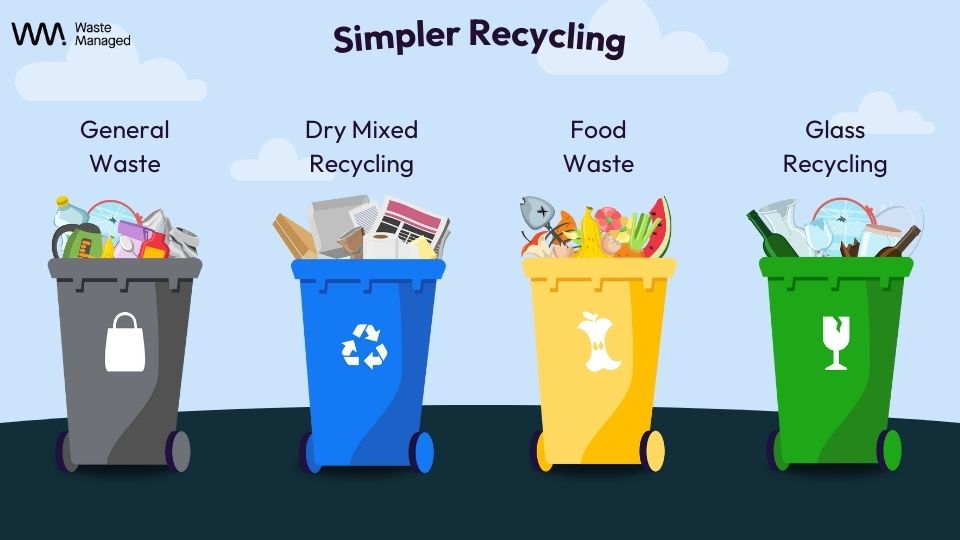
As a business owner in the UK, understanding your duty of care regarding waste management is not just about legal compliance; it’s also about environmental responsibility and ethical business practices.
In this guide, we’ll explain to you what duty of care actually means, the legislation surrounding it, the importance of waste management, and the essential steps to ensure compliance for your business.
Table of Contents
- What is Duty of Care?
- Waste Management Duty of Care: Key Components
- Importance of Duty of Care in Waste Management
- Tips for Ensuring Compliance
- Waste Duty of Care Facts and Statistics
- Conclusion
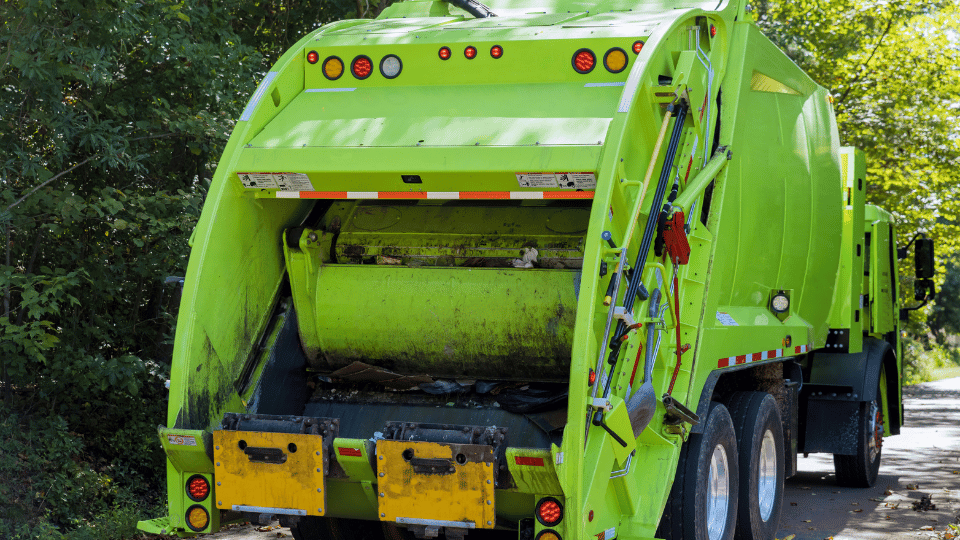
What is Duty of Care?
To put it as simply as possible, Duty of Care for waste management means that businesses have a responsibility to clean up and dispose of the waste their business makes to keep people safe and help the environment.
It refers to the legal obligation imposed on businesses and individuals to responsibly manage and dispose of their waste to prevent harm.
This duty extends from the point of waste generation to its final disposal or recovery.
Duty of Care Legislation
In the UK, the Environmental Protection Act 1990 (EPA) outlines the legal framework for duty of care regarding waste management.
This legislation imposes responsibilities on waste producers, carriers, and disposal facilities to ensure proper handling, transportation, and disposal of waste.

Waste Management Duty of Care: Key Components
Waste Identification and Classification
Proper waste identification and classification are essential for determining the appropriate handling and disposal methods.
Businesses must categorise their waste according to the European Waste Catalogue (EWC) codes, which classify waste based on its origin and composition.
Waste Transfer Note (WTN)
A Waste Transfer Note is a legal document required for any transfer of waste between parties.
It must detail the type and quantity of waste, its origin, destination, and the parties involved.
WTNs help track waste throughout its journey and ensure accountability at each stage.
Waste Carriers Licence
Businesses involved in the transportation of waste must hold a valid Waste Carriers Licence issued by the Environment Agency or relevant authorities in Scotland, Wales, or Northern Ireland.
This licence ensures that carriers meet specific standards and legal requirements for waste transportation.
Does Your Business Actually Move the Waste? If your waste is being collected by the waste collectors (also known as bin men) then your business does not need a waste carrier licence. You only need this if you are the waste collector e.g. Biffa or your local council.
Record-Keeping and Documentation
Maintaining accurate records and documentation is crucial for demonstrating compliance with duty of care obligations.
Businesses must retain waste transfer notes, invoices, and other relevant documents for at least two years and make them available for inspection upon request.
Top Tip: If you work with a waste broker (just like us!), they will do all the heavy lifting for you. This means no worrying about record-keeping and documentation, and we even provide a duty of care to you completely for free!
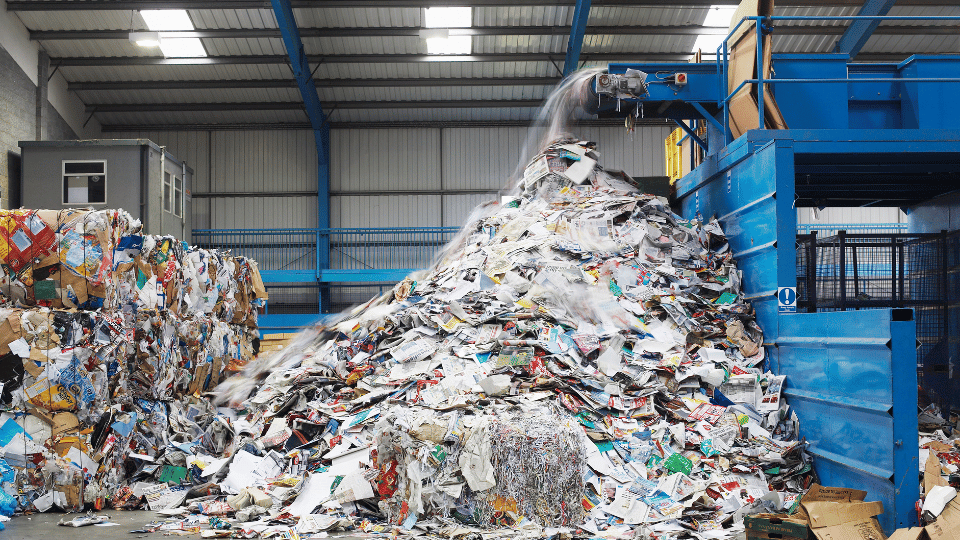
Importance of Duty of Care in Waste Management
Environmental Protection
Proper waste management practices, guided by duty of care principles, help mitigate environmental pollution and protect natural resources.
By reducing waste generation and promoting recycling and reuse, businesses can minimise their environmental footprint and contribute to sustainable development.
Public Health and Safety
Inadequate waste management can pose significant risks to public health and safety, leading to pollution, contamination of water sources, and the spread of diseases.
By adhering to duty of care regulations, businesses can safeguard the well-being of communities and prevent potential health hazards.
Legal Compliance and Avoidance of Penalties
Failure to comply with duty of care obligations can result in severe consequences, including fines, legal sanctions, and reputational damage.
By proactively fulfilling their legal duties, businesses can avoid costly penalties and maintain their regulatory compliance status.
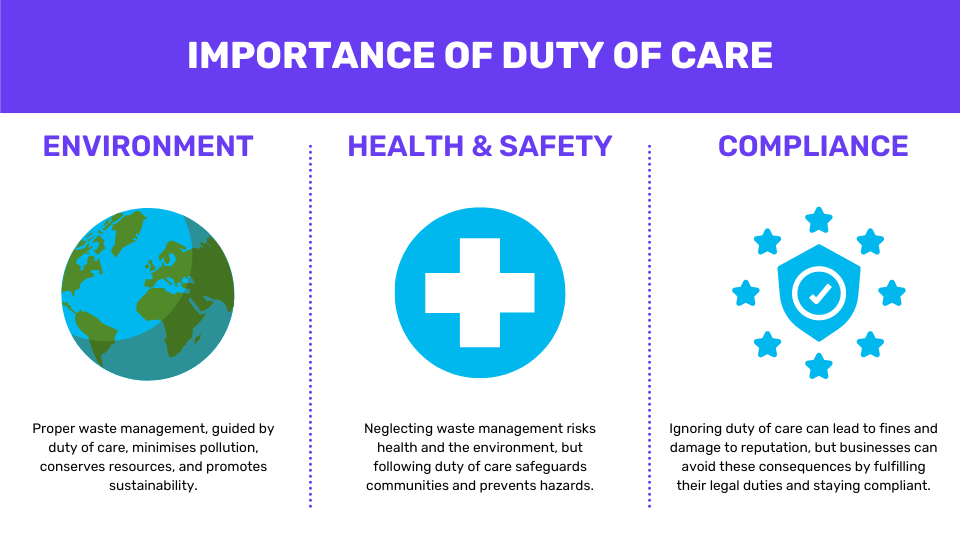
Tips for Ensuring Compliance
Conduct Regular Waste Audits
Regular waste audits help businesses identify opportunities for waste minimisation, recycling, and cost savings.
By analysing their waste streams and implementing efficient practices, businesses can optimise their waste management processes and enhance their environmental performance.
Educate and Train Staff
Effective staff training and awareness programmes are essential for ensuring compliance with duty of care regulations.
By educating employees about proper waste handling procedures, businesses can create nd maintain a culture of environmental responsibility and reduce the risk of compliance breaches.
Partner with Licensed Waste Management Providers
Working with licensed waste management providers ensures that waste is handled and disposed of legally and responsibly.
Businesses should verify the credentials and compliance status of their service providers to avoid potential liabilities and ensure ethical waste management practices.

Waste Duty of Care Facts and Statistics
- Approximately 60% of waste in the UK is generated by businesses.
- In England alone, businesses produce over 41 million tonnes of waste each year.
- Only about 45% of businesses in the UK are compliant with their duty of care obligations for waste management.
- The UK waste management sector contributes around £9 billion to the economy annually.
- Waste crime costs the UK around £600 million per year – this is the equivalent of paying the annual salary of 15,000 doctors in the UK.
- Recycling one tonne of paper saves about 17 trees, 7,000 gallons of water, and 4,100 kilowatt-hours of electricity.
- About 90% of businesses could save money by implementing more efficient waste management practices.
- The UK government aims to recycle at least 65% of municipal waste by 2035.
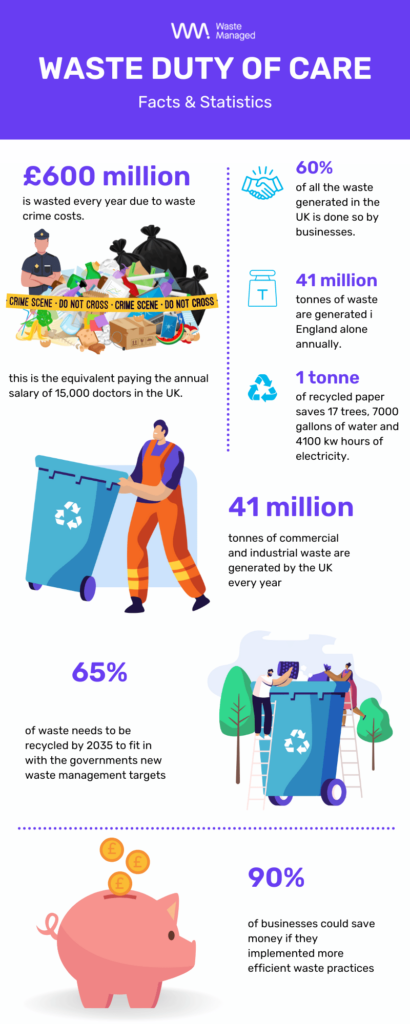
Conclusion
Understanding and fulfilling your duty of care obligations in waste management is essential for protecting the environment, public health, and legal compliance.
By implementing effective waste management practices, businesses can minimise their environmental impact, reduce costs, and contribute to a sustainable future.
Remember, compliance with duty of care regulations is not just a legal requirement — it’s a moral and ethical responsibility that benefits society as a whole.
About the Author

Steve Traviss
Procurement & Sustainability Officer
Steve Traviss is MCIPS Chartered and is extremely passionate about the environment and corporate responsibility when it comes to sustainable waste disposal practices. Steve truly embodies everything we stand for at Waste Managed and in 2022, Steve took part in a world record scuba beach clean up in Thailand which we’re incredibly proud of him for. Steve researches and writes a lot of our blog content on our website and draws off of a wealth of experience in the waste management industry and knowledge of UK environmental legislation.


